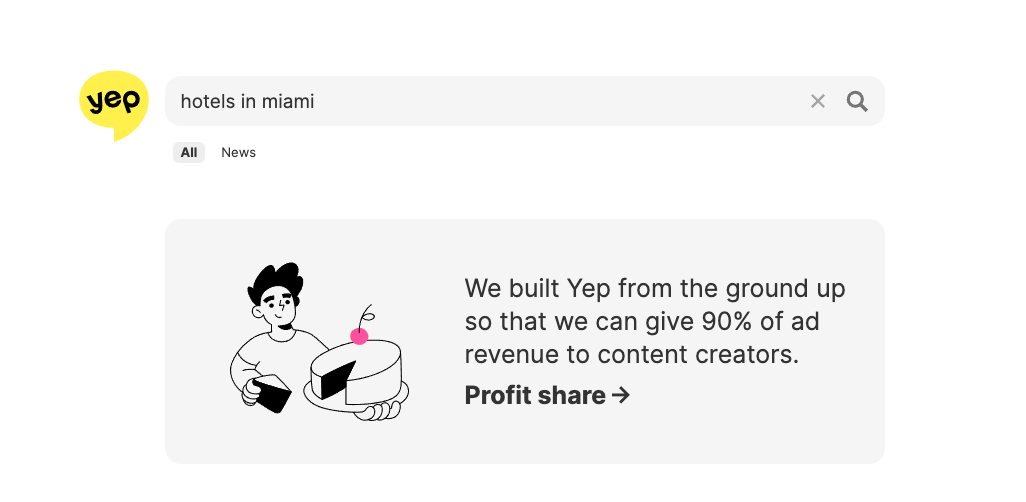Table of Contents
Ahrefs has announced that they are launching their own search engine called “Yep”, plowing $60 million of their own resources into the project aimed to compete with Google and Bing.
Yep has a unique value proposition: a 90/10 revenue split in favor of content creators.
So, if content creators — website owners, media brands, etc. — start getting a ton of traffic from Yep, they will be paid 90% of their site’s ad revenue.
In this video, we will be discussing the details of the project and give you some thoughts and insights about whether or not I think this project is going to work.
Watch the short video to see my reservations about Yep.
What is Yep?
Ahrefs is a big player in the SEO industry. Over 50,000 SEO consultants and agencies use Ahrefs suite of SEO tools, generating $100M+ annual revenues. They’re based in Singapore with a team of 90 worldwide.
Ahrefs first announced they were working on Yep in March 2019. This new search engine is the brainchild of Ahrefs CEO, Dmitry Gerasimenko.

According to TechCrunch, a team of 11 have been developing this since 2019, with Gerasimenko actively involved in the project from the start.
Ahrefs are currently recruiting another six developers and data scientists for the core product team.
Ahrefs are building this with 12 years worth of 24/7 live data from websites and backlinks — petabytes of information — as the foundations. One of their tools, AhrefsBot visits, and stores data from 8 billion websites every 24 hours.
Unlike other search engines that aren’t Google or Bing, Yep won’t rely on APIs. Nor will they use cloud-based servers. Yep already have 1,000 servers up and running, storing over 100 petabytes of data so far.
Gerasimenko is shunning reliance on cloud servers, saying they’re too expensive for the vast infrastructure Yep will need. He plans on having thousands of high-end servers coming online once search volumes accelerate.
So, that’s the backstory. Yep has been developed from the ground-up — leveraging Ahrefs vast SEO datasets and crawlbot — and will soon be live worldwide in as many languages as possible.
How does Yep work?
Yep works pretty much like any other search engine, from a users’ perspective.
Yep’s market differentiator offers “an unbiased, private search experience that rewards and compensates the makers behind the content.”
Users won’t be bombarded with adverts and popups, and won’t be tracked across the web, giving them a better experience.

From a website owner’s perspective, the 90/10 profit share model is the beauty of Yep.
“90% of advertising profits are paid directly to creators.”
Here’s how they explain it:
“Let’s say that the biggest search engine in the world makes $100B a year. Now, imagine if they gave $90B to content creators and publishers. Wikipedia would probably earn a few billion dollars a year from its content. They’d be able to stop asking for donations and start paying the people who polish their articles a decent salary. There would be no more need for paywalls and affiliate links, so publishers who’ve had to resort to chasing traffic with clickbait articles and filling their pages with ads would be able to get back to doing investigative pieces and quality analysis.”
Ahrefs goes onto say, “And the best thing? You don’t have to be an expert to benefit.”
Whether you’re an SEO professional or just love creating content about pancakes, you will benefit from Yep search traffic. It’s that simple, and as a TechCrunch journalist said:
“Perhaps it sounds a little idealistic, but damn it, that’s what made me excited about Yep in the first place. It represents the faintest of echoes from a web more innocent and more hopeful than the social-media poisoned cesspool of chaos and fake news we often find ourselves in today.”
Will Yep be a success?
Ahrefs has already developed one of the best SEO tools in the market. They’ve got a tremendous company, team, and set of products.
Before I go further, I have to give kudos to Ahrefs for investing $60M of their own money into this. That takes guts – I am genuinely rooting for Yep to be a success.
However, I have some reservations . . .
Reservation #1: The search results have a long way to go
I played around with a number of search queries in Yep and compared them against Google.
The algorithm has quite a way to go in terms of feeding the right results.
https://t.co/QMEv72N3Cv results have a long way to go compared to Google. Google answered me me in position 2 (featured snippet is off). Yep is several pages in without an answer and Viagra spam. pic.twitter.com/0Zm4ROvUMC
— Paul Shapiro – paulshapiro.eth (@fighto) June 4, 2022
As it stands right now, it’s in no shape to compete with the likes of Google, Bing or even Duck Duck Go.
Reservation #2: Can Yep pull in enough traffic from creator-economy content?
Ahrefs will have to drive A LOT of money and marketing to get creators/website owners to start using Yep. They’re competing with Google — which generated over $200 billion from advertising in 2021 — the only search engine that really exists.
Ahrefs are making this big bet on the creator economy, promoting this as a creator-friendly search engine. As a go-to-market strategy, it’s not bad.
The thing is, nobody blogs anymore. I’m not saying blogging is dead. But bloggers and content creators have moved on. People ‘blog’ on YouTube, TikTok, Instagram and create content on a dozen other platforms. Most aren’t reliant on traffic from Google anymore.

In press statements, Ahrefs made that point, referring to how YouTube’s parent company Google (Alphabet, ultimately) split profits with video creators:
“We saw how YouTube’s profit-sharing model made the whole video-making industry thrive.”
Without knowing the details on Google’s decision making, there’s a good chance they did this purposefully with YouTube content creators but not with website owners/content creators in SERPs. That model wouldn’t work — it would get spammed out — and the creator market wasn’t going to hang around long enough to make it worthwhile.
Sure, marketers and SEOs create content — 90% of the time for clients, 10% for themselves — to pull in traffic and sales leads. The purpose of SEO is to bend the Internet to our will, to get people into the ecosystem of companies paying for SEO.
As a B2B business owner who does create content, I don’t care about ad revenue profit sharing. I don’t want ads cluttering up the user experience; that would destroy the sanctity of the relationship I’m building with my customers. Ultimately, the value I generate from those relationships is worth way more than I could ever get from ad-based revenue.
Reservation #3: How will Yep generate ad revenue?
This brings me neatly to my third reservation: How is Yep going to make money, for themselves, advertisers, and content creators?
In order to make money from ads, search engines need a bunch of things:
- Search engines need to track user data. Ahrefs have said: “We do save certain data on searches, but never in a personally identifiable way. We will track how many times a word is searched for and the position of the link getting the most clicks. But we won’t create your profile for targeted advertising.”
- Search engines need an advertising platform, or will they accept third-party ad platforms? Ahrefs haven’t been clear on this yet.
- Adverts need placement. Whether these are banners, popups, sponsored SERP links, or affiliate links — whatever they are, ads need a clearly defined position on websites and in search results. Again, Ahrefs have been vague about where adverts will be placed.
When it comes to revenue generation, ad management, placement, and cookies, time will tell how this will play out.
Reservation #4: Can Yep avoid the same problems as other search engines?
Yep is trying to be everything Google isn’t: the anti-Google.
Hence sharing 90% of ad revenue with content creators/website owners and being big on privacy.
However, if they’re going to make money from ads, cookies are needed. Offering a “private search experience” simply means they won’t track individual users. Leaning into the cookieless era we are now entering; in other words, falling into line with what legislation is already forcing website owners and search engines to do.
Even with this privacy-centric model, I don’t think Yep can avoid the same problems as Google and other search engines. There’s a good chance this will become a search engine used by and manipulated by SEOs.
Yep could quickly erode its potential competitive advantages over time.
- Can they avoid the rising tide of AI-generated content?
- Will Yep somehow prevent SEO manipulation?
- Do they have a chance against black hat SEO tactics that Google has spent decades defeating?
I believe Yep’s value proposition is a smart one, I’m just not convinced it’s sticky enough, and I don’t think it will solve the problems they’re hoping it will.
Do I think Yep will be successful?
Now, this is just my personal opinion. I want them to succeed, I’m rooting for them; it takes brass balls to build a search engine with $60M of your own money.
However, I think there’s a bigger play going on with this. Ultimately, I don’t think it’s purely about building a search engine for content creators. To me, that’s simply a smart go-to-market strategy. I like the idea, but — (disclaimer) I’ve got no proof — this could be a business play for Ahrefs SEO tools.
I know Ahrefs is a very expensive company to run. Yes, they’re generating over $100M in revenues, but their proprietary tech costs a fortune to operate. It could be a long-term strategy to scale Ahrefs, while saving $100M in operating costs, with the savings generated from building and operating a search engine.
Competing against Google is a Quixotic mission on an epic scale in the SEO industry. But, winning and leveraging a percentage of Google’s traffic to save money running an expensive suite of SaaS tools — that’s a smart play.
Can Yep take Google down?
No, honestly as much as I wish it, I don’t think Yep will be a success in that sense. Google is Google. I won’t be using Yep. I won’t recommend clients invest time or money to rank on Yep.
Will you be using Yep, as an SEO, a content creator, or for clients?